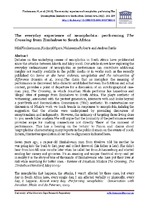| dc.contributor.author | Flockemann, Miki | |
| dc.contributor.author | Ngara, Kudzayi | |
| dc.contributor.author | Roberts, Wahseema | |
| dc.contributor.author | Castle, Andrea | |
| dc.date.accessioned | 2017-05-22T14:11:55Z | |
| dc.date.available | 2017-05-22T14:11:55Z | |
| dc.date.issued | 2010 | |
| dc.identifier.citation | Flockemann, M., et al. (2010). The everyday experience of xenophobia: performing The Crossing from Zimbabwe to South Africa. Critical Arts, 24(2): 245-259 | en_US |
| dc.identifier.issn | 0256-0046 | |
| dc.identifier.uri | http://hdl.handle.net/10566/2864 | |
| dc.identifier.uri | http://dx.doi.org/10.1080/02560041003786516 | |
| dc.description.abstract | Debates on the underlying causes of xenophobia in South Africa have proliferated since
the attacks -between March and May 2008. Our article shows how exploring the everyday
'ordinariness' of xenophobia as performance can contribute additional insights not readily
available in the public media or in works such as the recently published Go home or die
here.- violence, xenophobia and the reinvention of difference (Hassim et al. 2009). The claim
that as metaphor the meaning of performance is discovered in the dialectic established
between the fictitious and actual context, provides a point of departure for a discussion of
an autobiographical one-man play, The Crossing, in which Jonathan Nkala performs .his
hazardous and 'illegal' rites of passage from Zimbabwe to South Africa. The play's aesthetic
of 'witnessing', associated with the protest generation, intersects with and looks beyond a
post-Truth and Reconciliation Commission (TRC) aesthetic. To contextualise our discussion
of Nkala's work we track trends in responses to xenophobia, including the suggestion that
the attacks were underpinned by prevailing discourses of exceptianaJism and indigeneity.
However, the intimacy of targeting those living close to you needs fuller anatysis. We will
argue that the liminality of the performance event provides scope for making connections not
directly 'there' at the moment of performance. This has a bearing on the 'return' to Fanon and
claims about 'negrophobia' characterising many reports in the public domain on the events
of 2008. In turn, this invites speculation about the re-alignments indicated here. | en_US |
| dc.language.iso | en | en_US |
| dc.publisher | Routledge | en_US |
| dc.publisher | UNISA Press | en_US |
| dc.rights | This is the author-version of the articled published online at: http://dx.doi.org/10.1080/02560041003786516 | |
| dc.subject | aesthetic engagement, exceptionalism, indigeneity, negrophobia, performance, post-TAC, xenophobia | en_US |
| dc.title | The everyday experience of xenophobia: performing The Crossing from Zimbabwe to South Africa | en_US |
| dc.type | Article | en_US |
| dc.privacy.showsubmitter | FALSE | |
| dc.status.ispeerreviewed | TRUE | |
| dc.description.accreditation | DHET | en_US |

